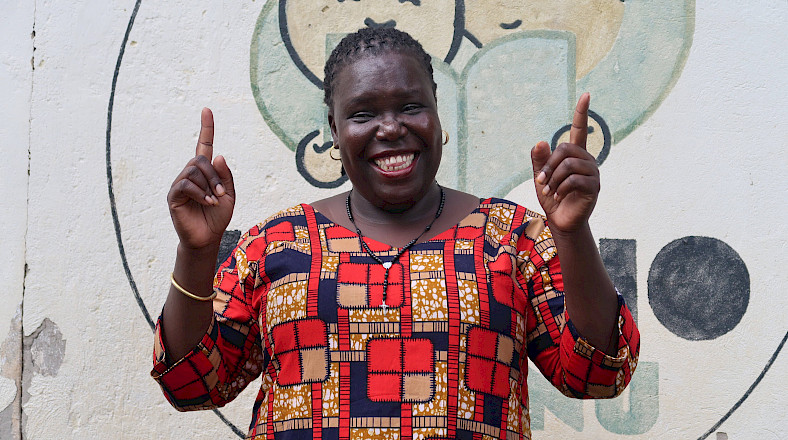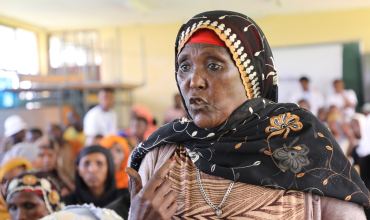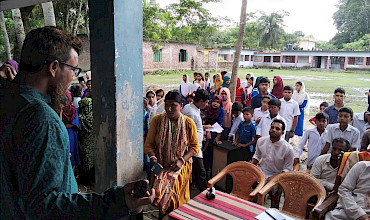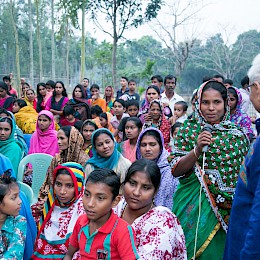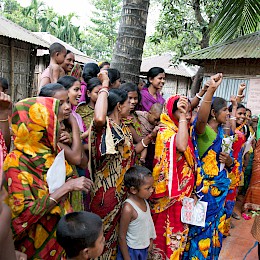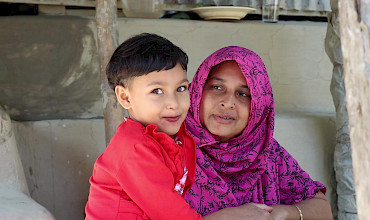
Any successful effort to end undernutrition must prioritise the engagement, inclusion and empowerment of all rights-holders. Given women’s central role in providing proper nutrition for their families and managing household water supplies, Right2Grow prioritises their participation in decision-making on nutrition and water, sanitation and hygiene (WASH) at all levels. However, gender equality and well-nourished generations cannot be achieved by empowering women alone. It also requires the involvement of men.
“Women's empowerment transcends being just a buzzword; it stands as an indispensable catalyst for societal progress and development, particularly in the journey to gender equality.” So begins an article by Violah Nayebare, communication and advocacy officer at The Hunger Project Uganda, following the 2023 Women Deliver conference. When women and girls are empowered to claim their rights, it leads to improved health and nutrition for themselves and a better quality of life for their families and communities. However, for many women, their right to food, water and nutrition is still not a reality.
Undernourished and overlooked
Women play a critical role in global food systems and are the cornerstones of their families’ food, nutrition and water security. They bear the primary responsibility of procuring and preparing food for their households, and fetching water for domestic use. Paradoxically, they, along with children, frequently suffer the most from undernutrition. In fact, women and girls make up 60% of all undernourished people in the world.[1] In situations of food scarcity, women often eat last and least, and they may even be restricted to eat some types of nutrient-rich foods due to gendered food taboos.[2] Furthermore, they bear the brunt of collecting water and firewood, which is not only time-consuming but also exposes them to increased risks of violence.
Right2Grow recognises and champions the pivotal role of women as workers, caregivers and leaders in shaping a healthier future for themselves and their families. The programme adopts a range of gender-transformative tools that support women to claim their rights to WASH and nutrition, while also providing platforms for their voices to be heard. Because when women lead in advocacy, the whole society benefits.
Combating undernutrition in South Sudan
In South Sudan, Right2Grow partners deal with a highly patriarchal society, where gender roles are quite rigidly defined. Florence Paul can still vividly recall her first project visit to the Akobo/Pibor region in South Sudan, an area of around 260.000 people near the Ethiopian border. Florence works for CIDO, a women-led organisation that is one of the 7 civil society partners working together on Right2Grow in South Sudan. Akobo/Pibor, Florence tells us, is a pastoralist community, characterised by inter-communal conflict, poverty, cattle raiding and flooding. These challenges significantly exacerbate the risk of undernutrition and contribute to food insecurity in the area.
Women in Akobo/Pibor are not free to speak in front of men and are forced to stand aside while men make decisions. Furthermore, cultural beliefs prohibit them from eating certain foods, like fish, eggs or certain parts of chicken, due to concerns about their health or the well-being of their unborn children. As a result, women and girls are twice as likely to experience undernutrition compared to men and boys. Being a woman herself, Florence recounts the challenges she faced in her work: "I remember standing in front of the men in one of the villages in this region and not being taken seriously.”
I remember standing in front of the men in one of the villages in this region and not being taken seriously.
Living proof
Demystifying the myths surrounding certain foods was not easy, Florence recalls: "I knew about a certain kind of fish whose head women were not supposed to eat because it was said to bring bad luck. When I ate this in front of the women, they were surprised and worried that I would not be able to have children or that I would get sick. They were even more surprised when I told them that I have 3 healthy children. In the end, they realised that these were just misconceptions and that they were completely unfounded. We taught them to talk to their husbands and explain the benefits of eating this kind of food. They used me as an example: ‘Look, even this lady eats the head of this fish and nothing has happened to her.’ I was their living proof.”
Changing social norms that influence women’s dietary practices and feeding behaviours requires a holistic approach. CIDO collaborates with diverse stakeholders to address the interlinkages between nutrition, WASH, and gender issues. According to Robert Sochi, CIDO's programme coordinator, this has been a 'long-term, consistent and collective journey' with other development partners, local authorities and national government. Florence agrees that an integrated approach is the only way forward: ’’A single approach may make a little difference in reducing undernutrition, so it is imperative to address both nutrition and WASH, as well as gender issues."
Small doable actions
Florence is particularly proud of the establishment of 50 Mother-to-Mother Support Groups. They offer a safe place where pregnant women and young mothers can share experiences and receive critical information on improved nutrition and WASH practices to support the health of their families. "60% of the trained mothers have established kitchen gardens in their homesteads to help them use locally available vegetables to improve their dietary balance and combat undernutrition,” she shares enthusiastically.
Florence also mentions women’s representation and leadership in Water User Committees, whose role is to maintain community water sources. Right2Grow has been able to push for women’s inclusion in these committees, which have traditionally been dominated by men. When women are engaged as equal partners in water resource management, WASH services and facilities become more responsive to their unique needs. "Bringing women on board has enabled them to address water issues, as they bear the brunt of walking distances to fetch clean water. They are now able to raise WASH issues that directly affect them, such as menstrual hygiene, which were not fully addressed or discussed before.”
Make good nutrition everyone’s responsibility
Recognising that nutrition is not just a women's issue, CIDO is careful not to overlook the experiences of men and boys during project activities. In many households, men make key decisions about what to grow and which livestock to raise. They often decide what to sell, how much to store, and what foods to buy. This makes them well positioned to tackle undernutrition in their own homes and in the wider community.
Through training and coaching, CIDO tries to build appreciation for women’s daily work contribution and facilitate discussion on how the workload can be shared more fairly. Men support groups have encouraged men to rethink gender-based stereotypes and change their behaviour. Florence explains: ’’We engage men as agents of change while being accountable to women's voices to prevent violence against women and girls. We want to bring men closer to reality and show them their attitudes and the way they treat women and girls.’’
As a result, men have started to adopt positive habits, such as participating in feeding the family and supporting their wives in maintaining vegetable gardens. Moreover, CIDO has trained communities to recognise signs of undernutrition and promote health seeking behaviours. ’’Men and women now work together when children get sick or show signs of undernutrition. Men now accompany their wives to health facilities and nutritional stabilisation centres where severe undernutrition in children under five is treated. Men now even seek medical attention themselves for their children and take their children to the hospital when they are sick, which never happened before.”
Building your own table
To ensure that everyone can enjoy their right to lead healthy and productive lives, changes in mindset and behaviour are required at all levels - from the household up to the state. The Right2Grow programme in Uganda exemplifies how Civil Society Organisations (CSOs) and Community Based Organisations (CBOs) have complemented their community awareness efforts with advocacy actions to bring local realities to the discussion table. Violah from The Hunger Project Uganda explains: “We try to elevate the voices of affected communities, including women, and facilitate their participation in relevant advocacy spaces from local to national level. This way, Right2Grow partners help to ensure that women’s concerns shape government budgets and policies.’’
When thinking of an inspirational leader who has claimed her space and demanded women’s inclusion in decision-making processes, Violah immediately brings up Shilla Adyero. Shilla is the Director of Lutino Adunu, a CBO based in Nwoya district, dedicated to addressing the educational and community needs of populations residing in northern Uganda. She also serves as the Chairperson of the CSO Nutrition Platform in Nwoya District – a structure established by Right2Grow to coordinate CSO strategies, programmes and resources with district nutrition plans. Shilla has been working tirelessly to bring local voices to decision-making spaces. During one of her engagements she boldly stated: “I’m a troublemaker, a sensible troublemaker. If you don’t invite me to your table, I will create my own. And I will make a lot of noise.’’
If you don’t invite me to your table, I will create my own. And I will make a lot of noise.
Within the Nutrition Platform, Shilla has prioritised the gathering of data to monitor the community's nutritional status and assess the quality of WASH and nutrition service delivery. Recognising the lack of evidence to inform financial decisions, she drafted a position paper that highlighted the need for funds to be allocated towards a nutrition audit. Presenting her paper during the district's budget dialogue yielded significant results: the district committed 10% of its local revenue to fund the audit. ’’Leaders like Shilla show us that women not only possess a powerful voice, but also have the power to make meaningful and impactful contributions in development and achievement of better nutrition outcomes,” says Violah.
A bright and equitable future
Unless we address fundamental gender inequalities in food, WASH and nutrition, we fail to provide sustainable gains in food security, for men, women and especially for children. Local governments should actively promote community-based approaches that involve women in leadership roles, recognising their potential to bring about positive changes in dietary patterns, health, and hygiene practices. Simultaneously, there should be efforts to encourage the engagement of men and boys as allies in the fight against undernutrition and in the empowerment of women, acknowledging that gender equality benefits everyone.
According to Violah, it is imperative for all stakeholders to recognise the profound link between nutrition, WASH, and gender issues. Policy makers should therefore formulate policies that support integrated approaches that address these interconnected challenges for sustainable development. Ultimately, Violah emphasises, we can only end undernutrition if we prioritise and include women in decision-making: "We must commit to providing the necessary support and opportunities for women to thrive as caregivers and leaders in shaping a healthier, more nourished world for all. By championing women's empowerment, we are sowing the seeds of a brighter, more equitable future.”
[1] UN Women (2012). “Facts and Figures.” https://www.unwomen.org/en/news/in-focus/commission-on-the-status-of-women-2012/facts-andfigures
[2] Fonjong, L. (2022). The Role of Women’s Nutrition Literacy in Food Security: The Case of Africa.
Back to overview